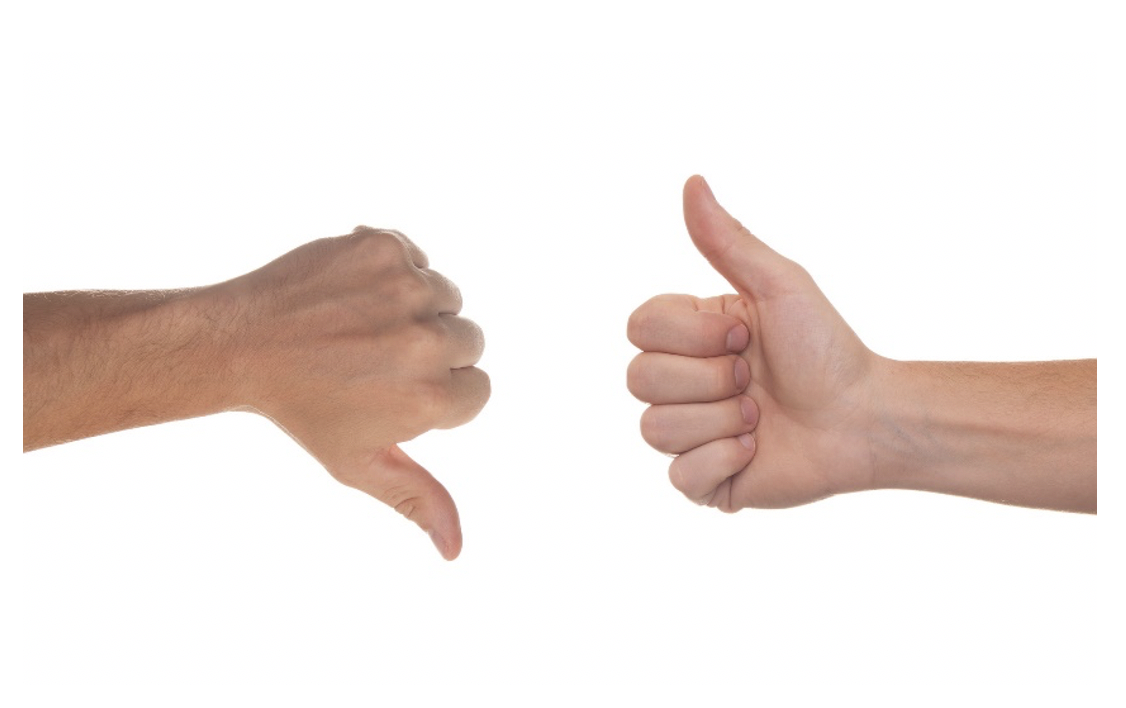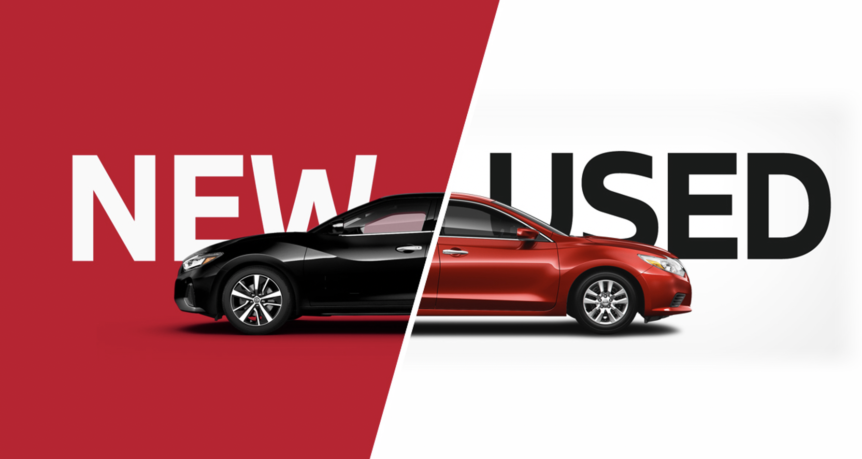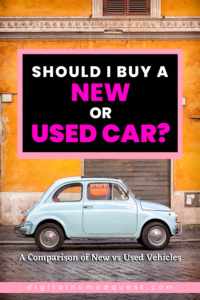When you’re in the market for a vehicle, one of the first and most important decisions you have to make is whether to buy a new or used vehicle. Of course, there are several factors that play into this decision – price, performance, efficiency, insurance rates, etc. Even the buying experience can have a roll in the decision. If you’re faced with a pushy salesperson at a dealership, you’re likely not going to opt for the new Sedan you were looking at, right?
In truth, there’s no right or wrong avenue to go down when buying a vehicle. For the right person, a used vehicle can prove to be just as valuable as a new vehicle – it’s all about lifestyle and preference.
In today’s article, we’re doing a deep dive into everything you should consider when trying to make your choice.
Used vs New Cars
Leasing
You have the option of leasing both new and used vehicles. When you lease, you tend to have lower monthly payments than if you financed the same vehicle with a loan that has the same terms.
Leasing is beneficial because you can start new leases on different vehicles every few years. Used vehicle leases, however, are not as common as new vehicle leases. To secure a lease on a used vehicle, you may have to do some serious hunting for a dealership that’s willing to work with you as not all dealerships are open to offering leases on used vehicles. Once you find a dealership who’s willing, though, a used vehicle could be a solid option because it will have already been through most of its depreciation, ultimately lowering your monthly payments even more.
Interest Rates
If you don’t have the cash to buy a vehicle outright, things can quickly get complicated when you start entertaining the idea of car loans. You’d expect the interest rates for used cars to be lower than that of new cars because they’re cheaper. Unfortunately, this logic is incorrect.
Manufacturers want to attract buyers and they do this by offering low interest rates – sometimes as low as 0% for a certain period of time – and cash rebates. Of course, this is only relevant to new cars, as used cars have been transferred into the hands of the dealership and are, for all intents and purposes, not the manufacturer’s problem anymore.
Often, this means that the bigger the price tag the car has, the less you pay on interest.
Insurance Rates
When the time comes to get an insurance policy, there’s a slight difference in how much you must pay to insure a new or used car. The major factors that play into this are the value of the vehicle and its age. Basically, used cars will rack up lower insurance costs than new cars because they are old and less expensive.
However, this isn’t set in stone. A Ferrari, one of the most valuable vehicles on the market, will likely cost more to insure regardless of whether it’s new or used because even used it is incredibly valuable and expensive.
Reliability
One of the biggest stigmas surrounding used cars is their reliability – buyers are worried that they’ll end up purchasing a piece of junk that’s basically 2 miles away from breaking down in the middle of the road, requiring a ton of costly repairs. This is a valid fear, but it’s highly exaggerated since vehicles are made much more durable than they were years ago. But even still, the idea that new cars or more reliable than used cars still tends to be true.
If you’re looking for a vehicle that is in tip-top condition and is guaranteed not to need any repairs due to reliability issues right out of the gate, then a new car is likely the best choice simply because you run the risk of a used car requiring repairs sooner.
Fuel Efficiency and Performance
Car manufacturers are constantly improving the efficiency and performance of their vehicles — whether it’s improving engines to have better fuel economy, making vehicles lighter using upgraded materials, or harnessing a ton of horsepower in incrementally smaller engines for every new model.
Keeping this in mind, used vehicles won’t always have the same efficiency as a new vehicle. This isn’t because the older vehicle isn’t good or was made poorly, though, it’s simply because since the vehicle was made, manufacturing technology and capability have advanced, leaving the older car more or less in the dust.
For example, some vehicles will come with features that are unheard of in older cars, such as “stop and go”, which is designed to boost fuel efficiency during periods of heavy traffic.
Asking Price
Obviously asking price is one of the most notable differences. Used cars will almost always have a lower price tag than a brand new vehicle purchased from the lot with a ribbon on it – there’s just no getting around that, unfortunately.
Of course, depending on what make and model your used vehicle is, it could still be pricier in its used state than a vehicle of a different brand. This relates back to the value of the vehicle.
Depreciation
One of the main reasons that used cars sell for less than new cars do is because of depreciation, which is a term that refers to how much of its original value a vehicle loses over time. For example, over a year a car’s value might decline from $12,000 to $11,000, which means that it depreciated by a percent of what it’s worth.
New cars usually lose most of their value within the first few years after being sold. This being said, if you buy a new car, the depreciation takes more of a drastic toll within the first three years of your ownership than it will over the subsequent stretch of three years and so on.
As always, though, there are exceptions to this rule depending on the brand of a vehicle and its specific model, as some brans depreciate more quickly than others.
Warranty
Warranties can, unsurprisingly, have quite a drastic impact on the cost of a new or used vehicle. If you purchase a used vehicle, it likely won’t come with any warranty coverage. So, if something goes wrong, it’s up to you to shell out the cash for repairs and replacement parts.
At some used car dealerships, you do have the option of purchasing some sort of warranty, but they are usually short-term and not as comprehensive. Generally, the only used cars that automatically come with warranties are Certified Pre-Owned Vehicles, as they are basically brand new, which prompts manufacturers to offer warranties on them.
The warranties of new cars are unmatched, however, as they are comprehensive and last the longest. They’re also standard when you buy a new vehicle, regardless of the brand, make, or model.
Pros And Cons

While both options have their pros and cons, making the decision comes down to identifying the factors that are most important to you.
Here’s a quick rundown of the pros and cons of both new and used vehicles.
Used Cars
Pros:
- More affordable upfront pricing
- Slower rates of depreciation
- Lower insurance rates
- Lower monthly payments on leases
Cons:
- High loan interest rates
- Limited warranties
- Not as efficient as new vehicles
- May not be as reliable
New Cars
Pros:
- Lower loan interest rates
- Better fuel efficiency
- More extensive warranties
- Reliability
Cons:
- Higher initial price tag
- Quicker depreciation
- Higher insurance rates
While it’s easy to look at this pros and cons list and think that a new car is obviously the way to go, it’s still important to know the benefits and drawbacks of both choices. You might opt for a new car and be very happy with it while your best friend may opt for a used car and be just as happy with theirs.
How To Save Money Buying A Car

Time your purchase appropriately.
When considering buying a new vehicle, put your sights on the end – the end of a slow sales week, the end of a slow month for a dealership etc. It’s at the end of these dry periods that sellers are going to start offering incentives for buyers. You might also want to consider the end of the year when dealerships are looking to sell off as much of their old inventory as possible to make room for next year’s models.
The incentives offered could be anything from a percentage off the price tag, a sweet ad-on, discounted maintenance costs or almost anything else that could prove to be enticing.
Shop ‘till you drop.
When you’re shopping for a new TV or laptop, you’ll probably check out more than one site and store to find the best price and it’s no difference when it comes to buying a new vehicle. Before purchasing, consider the various dealerships within a reasonable commuting distance of you and make it a point to visit all of them, using your knowledge of new and used cars to figure out which is best for you and then pairing it with timing to land on the best possible price.
You can even use online dealerships in your comparison, if you want. Just remember that when you shop online, you’re unable to test drive.
Skip the loan if possible.
Try to avoid taking out a vehicle loan if you can. Often, paying for your vehicle in cash can help you save a large sum of cash that you would otherwise be putting towards interest on your loan. In addition, many dealers offer cash discounts for these purchases, too.
Try to negotiate.
A good old game of negotiation can never hurt when you’re trying to save cash. Of course, negotiation is the most successful when the vehicle in question has some minor flaw such as scratches, a busted door lock, etc.
By knowing the value of the vehicle if it was in perfect condition, you can more easily haggle the price down if you find something wrong with it.
Avoid purchasing ad-ons.
If you’ve ever bought a vehicle, you know exactly how this works. You spend hours at the dealership, settle on a price, and are then handed to the finance manager to tie up all the loose ends.
It’s in this office that the manager will try to sell you all sorts of ads-ons—each one for a price, of course. They may offer everything from extended warranties, paint protection plans, gap insurance, tire protection plans, and fancy license plates that they claim are “only a few extra bucks a month”.
This is true, obviously, as some of these ads-on cost no more than $10 a month. However, that $10 can quickly add up, especially if you get sucked into multiple ad-ons. This being said, purchasing one or two ad-ons likely isn’t going to be the end of the world but you should keep in mind that sometimes, the ad-ons offered have been marked up by up to 300% before they were offered to you, which is a bit of a rip off, if you ask me.



Comments 1
Very Useful Information Based on Used Cars